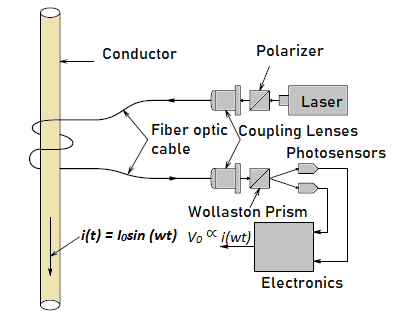Tag: Power systems
-
Sources of Power Quality Problems
Power quality may be affected by a number of issues. Our discussion in this article focuses on various devices and events that lead to problems in power quality. The common sources of power quality problems include: Power Electronic Devices Power electronic devices cause power quality disturbances and they are also susceptible to them. Variable speed…
-
Common Terms Used When Describing Power Quality Problems
Power quality has become an important issue to electricity consumers at all levels of consumption. This has especially been intensified by the common use of sensitive equipment and non-linear loads in both industrial and the domestic environs. In this article we look at some of the common terms typically used when describing power quality problems.…
-

Magneto-Optic Current Sensors for High Voltage, High Power Transmission Lines
One of the key challenges in measuring the electrical current in high voltage, high power transmission lines, is that of measurement circuit isolation. One way of measuring heavy 60 Hz currents in a conductor is through the use of a current transformer. A current transformer typically consists of a number of turns of wire wound…
-
AC to AC Power Converters with Intermediate DC Link: Types, Features & Applications
This category of AC drives that is often referred to as “Variable Frequency Inverters” is one of the most extensively used drives in industrial motor control applications. Generally, the concept of these inverter drives can be summarized into three parts: We have two main classifications of these AC drives that are based on the aforementioned…
-
DC to DC Power Converters: Function, Types, Operation & Applications
DC to DC power converters also referred to as choppers provide the means to change one DC voltage to another. Normally the conversion is to a lower voltage however, we also have step-up converters. DC to DC power converters are fed from a DC supply usually comprising an uncontrolled AC to DC converter or alternatively…
-
Equipment Grounding vs. System Grounding
Grounding or earthing an electrical system is the process of connecting all metalwork/frame of electrical equipment i.e. the non-current carrying part or some electrical component of the system such as the neutral point in a star-connected system, one conductor of the secondary of a transformer, and so forth to the main body of earth. An…
-
Switchgear Terminology & IEC Standards
Switchgear generally refers to the switching devices and their combinations, with the related control, measuring, protective and regulating equipment. The switchgear equipment basic purpose is switching and interrupting currents either under normal or abnormal operating conditions. Modern power systems, power lines and other apparatus operate at high voltages and carry large currents. When a short…
-
Air-Blast Circuit Breakers: Features, Operation & Applications
Air-blast circuit breakers utilize a blast of compressed air typically at a pressure of 25–75 bar, which is directed across the path to cool and eliminate the ionized gas, in other words the air-blast is employed as the quenching medium. The air-blast cools the arc and sweeps away the arcing products to the atmosphere. This…
-
Testing & Commissioning Protective Schemes
Generally protective equipment testing may be divided into three stages: Factory and commissioning tests confirm the performance of equipment during its development and fabrication, and its operational environment. Periodical maintenance ensures that this performance is maintained. For example, the relay manufacturer must provide sufficient testing of protective gear before it is accepted and commissioned. The…
-
The Principles of Power System Protection
The Function and Principles of Power System Protection The objective of power system protection is to detect faults or abnormal operating conditions and initiate corrective action. Principles of Power System Protection There are different principles used in accomplishing power system protection, we have discussed them in the following sections: Discrimination by Time In simple radial…